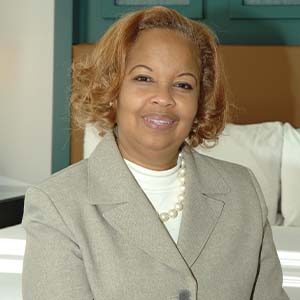ESPA President Jacquelyn Denise Reid on how hospitality can expand the definition of inclusive
 Celebrating the contributions of more than 13% of the U.S. population to the meetings industry and the world is something that needs to be done year-round. We thought a good way to mark the month would be to ask Jacquelyn Denise Reid, area event planning manager with Hyatt Centric French Quarter Hotel and Eliza Jane Hotel; president of Event Service Professionals Association (ESPA) and 2022 Smart Women in Meetings Visionary award winner, how she marks designated Black History Month.
Celebrating the contributions of more than 13% of the U.S. population to the meetings industry and the world is something that needs to be done year-round. We thought a good way to mark the month would be to ask Jacquelyn Denise Reid, area event planning manager with Hyatt Centric French Quarter Hotel and Eliza Jane Hotel; president of Event Service Professionals Association (ESPA) and 2022 Smart Women in Meetings Visionary award winner, how she marks designated Black History Month.
What does Black History Month mean to you?
Black History Month is the defining collective of my professional and personal life as I represent many unheard voices in the struggle who were ignored for generations so that I could have the opportunity of higher education, progressive employment and be a respected event service professional among my industry peers. February brings the once hidden and often ignored accomplishments of my ancestors to a national stage to educate Americans in print and on social media and to open a dialogue that was not too long ago a narrative restricted to one week a year and not even taught in institutions of education.
Black History Month is the time that I contact the local fire department to borrow a gas mask and replica signal light to use as props when I speak to classroom students about the multiple inventions of Garrett Morgan for example. I also use the opportunity to speak to students about the groundbreaking accomplishments of Black people in finance, medicine, technology, science and in hospitality. Black History Month is the welcome opportunity for me to initiate discussions with my colleagues of all nationalities on the importance of recognizing the role of Blacks in American history and continuing the conversation throughout the year. It is my task to educate and keep Black History alive by boldly destroying institutional discrimination established to erase any evidence of our rich legacy.
How have you leveraged your life experiences to help create memorable events?
In my 30-plus-year journey creating memorable hotel events for stakeholders as an event service professional, my initial conversations with meeting planners all begin with the universal language of travel and music. As an army brat, I initiate client dialogue with some bit of travel trivia to find a commonality with meeting planners while inquiring about their favorite or most recent travel destinations to set the tone for the planning process.
“It is my task to educate and keep Black History alive by boldly destroying institutional discrimination established to erase any evidence of our rich legacy.”
My passion for international travel has afforded me various opportunities to invite planners to explore events filled with New Orleans’ flavor and culture all while exposing attendees to menu options that they may not have realized meet their budgets. I also suggest sprinkles of live musical entertainment that planners may not have considered had I not used my background as a classically trained soprano to bring a creative flare to social, as well as corporate events, regardless of the preferred musical genre all while elevating the entire experience for the planner and attendees.
Why is diversity such an important component for events and the hospitality industry?
While DEI actually has roots in the Civil Rights Movement of the ‘60s, it is that same struggle with some improvement that is still prevalent to this day in events and in the hospitality industry where national culinary and executive management representation, as just two examples, is minimal by far. Corporate brands of late are recognizing the importance of a diverse workplace with equal representation to service successful events with staff that are proud to represent various ages, races, genders and socio-economic status reflective of a broader audience.
Read More: The Diversity Among Us
Corporate and social events alike basically strive for one common goal and that is to host a most memorable event for stakeholders. Diverse vendors—chefs, decorators, audio-visual technicians and a wealth of other industry talents—bring unique culture to event destinations. It is imperative for our industry to deliberately open doors and invite various extensions of our diverse community to be a part of this journey.
New Orleans, for example, is one of a very select few of premier tourist destinations in North America that have historically and consistently celebrated the diverse cultures that encompass the various flavors of the community at large. It is so uniquely gifted and the hospitality community is a close-knit group of talented professionals who have for many decades gone about the duties of incorporating varieties of Cajun and Creole histories in the tourism story of the Crescent City growing new generations of visitors every day.
How can meetings become more accessible and inclusive?
As the dimensions of accessibility and inclusivity ever evolve, so are meetings required to grow, learn and train within the same spectrum authentically inviting underrepresented communities to the discussion. ESPA has been on the forefront of the services industry to equip professionals with the necessary tools that define what is required to host successful events that are accepting to all stakeholders—to feel a sense of genuine inclusiveness by featuring critical content at annual conference sessions and monthly webinars with educated panel discussions.
Prior to the pandemic, ESPA began creating an invaluable Accessibility Toolkit designed for membership to provide to meeting planners with checklists and key factors to inquire/investigate when scouting an event destination whether for hotel or convention center. This working document is ever-evolving and constantly updated as needs for effectively hosting events that include non-obvious impairments—religious-dietary, visual, sensory, service animals and mobility limitations—become more of a focus in the event service profession.
Professional organizations are initiating the discussions by hosting webinars, in-person trainings and constantly inviting accessible and inclusive topics to their agenda. It is up to event professionals to participate in the discussions as well as listen and learn in order to cultivate an accepting culture within our society.
How can the industry do more to promote diversity?
Our industry has a requirement and duty to promote diversity, which is a needed fabric to the very survival of meetings that should reflect the essence of what embodies the stakeholders’ touch points. Event professionals are charged to sound the alarm that it is our due diligence to do business with vendors who may not otherwise be considered for certain exclusive events and hire staff from entry level to top-line executives that reflect a welcoming culture.
Read More: Diversity, Equity and Inclusion Are Good for Your Meetings (and Business)
Thanks to prominent organizations such as Tourism Diversity Matters (TDI) for sounding the alarm and to industry leaders for taking responsibility within each destination to promote diversity on a municipal level. With the recent release of the Events Industry Council’s (EIC) Equity Benchmarketing Study, the foundation for candid conversations and industry improvements is clear.
What we choose to do with the results and the information that we learn from the study, dictates how the industry grows and sometimes difficult, sobering and informative conversations are necessary. But most importantly, the conversations can never end and must evolve just as vast segments of society evolve culturally, racially and economically.




